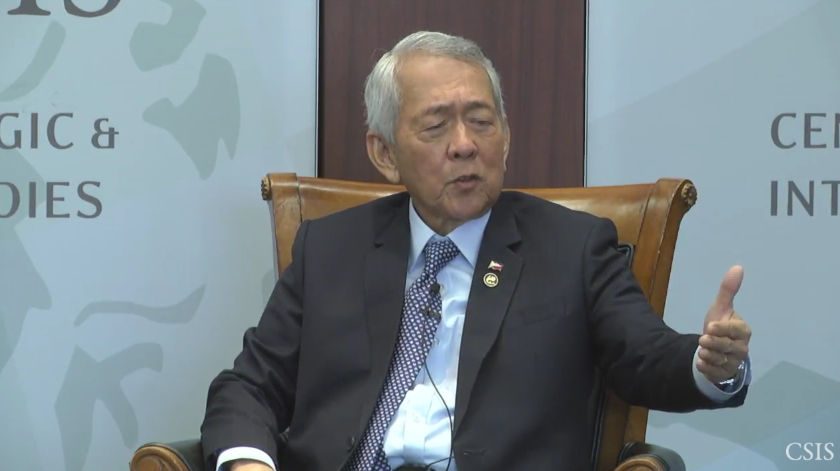SUMMARY
This is AI generated summarization, which may have errors. For context, always refer to the full article.

MANILA, Philippines – Philippine Foreign Secretary Perfecto Yasay Jr said late Thursday, September 15, that the Philippines is not prepared to have bilateral discussions with China over the West Philippine Sea (South China Sea) dispute.
Yasay, who is in the United States primarily for the United Nations General Assembly in New York, made the statement at a forum at the Center for Strategic and International Studies (CSIS) in Washington DC.
Amy Searight, CSIS Senior Adviser and Director for the Southeast Asia Program, asked Yasay about the Philippines’ next steps on its sea row with the regional giant following President Rodrigo Duterte’s decision to tap former president Fidel Ramos as a special envoy to break the ice with China.
Yasay responded, “We are not, at this point in time, prepared to sit down with China on bilateral engagements with respect to our dispute in the South China Sea until and unless both parties are prepared to sit down and discuss this matter.”
He explained that the Philippines and China have different standpoints on the context of such bilateral discussions.
“To begin with, we cannot proceed on engaging China in bilateral talks where China says that it can only talk outside of the framework of the arbitral tribunal’s decision, in the same way that the Philippines is insisting that if we talk, we should only talk within the framework of the arbitral tribunal’s decision,” Yasay said.
In July, an arbitral tribunal in the Permanent Court of Arbitration in The Hague, the Netherlands, ruled in favor of the Philippines in its historic case against China over the West Philippine Sea. China, which refused to recognize the proceedings, rejected the ruling.
Engage all stakeholders
Echoing the position taken by the previous administration, which was at odds with China over its decision to bring that country to court, Yasay said the sea row was just “a small portion” of the Philippines’ overall relationship with China.
The Philippine official explained that the best route would be to engage all stakeholders, “including China, our neighbors in pursuing other interests that include trade, investment, infrastructure development, cultural exchanges, people-to-people contact.”
Yasay “said a natural effect of engaging China in other areas of concern will precisely open the door, open unconditional discussions into this dispute with the view of resolving the dispute peacefully.”
Linking this to Ramos’ mission, Yasay said: “This is the kind of job and special authority on the part of President Ramos to pursue. It has nothing to do with engaging China in these bilateral talks with respect to the South China Sea disputes. “
Upon Duterte’s instructions, Ramos went to Hong Kong in early August to meet with his “old Chinese friends.” The former president described the meeting as just an “icebreaker.” (READ: When the Philippines sang, danced with China on a Manila Bay cruise)
At the CSIS forum, Yasay expressed hope that Ramos will be named the country’s official special envoy “with respect to the areas of concern that relate to what we should promote as our relationship with China.”
“We would hope that this would open the doors for more openness to talk without any conditions about how we will resolve our dispute with respect to the South China Sea,” he said.
Apparently alluding to the Philippines’ long-standing ties with the United States, which seemed to be taking a different route under the Duterte administration, Yasay stressed that forging stronger ties with China, among others, did not mean that the Philippines was “alienating the other.” (READ: Duterte attacks US, praises China)
“I’d like to just emphasize that even as we would like to forge closer relationships with our neighbors with China, with the rest of ASEAN…it does not necessarily mean that forging a closer relationship with one is alienating the other,” he said.
“This is precisely what he (Duterte) means in the context of saying that we must pursue an independent foreign policy. That is what our Constitution mandates, and to pursue amity with all nations,” he added. – Rappler.com
Add a comment
How does this make you feel?
There are no comments yet. Add your comment to start the conversation.